We know it might get boring if we talk about every single conversation we had with some friendly Chinese. So, once and for all, we’ll give a summary: we had thought the great contact to Chinese was at least partly due to the company of a native speaker. However, Chengdu was the first station in China where we travelled on our own without Wu Jiqing. Of course, having large conversations is much more difficult and telling a taxi driver where we want to go has become a challenge. Nevertheless, we are maybe even more surprised now about the friendliness, helpfulness and open-mindedness of the Chinese we meet. Those speaking at least a little English are keen on practising their language skills and making friends with us. And the others are also interested in talking with us. Although often “hello” is the only word they know, they do not hesitate starting the communication with exactly that word. And by drawing and using signs and hands it works better than you may think. On the other hand, when we need some help or service from them (for example buying train tickets or ordering meals), they are extremely patient and creative. They will call someone by phone who can speak English, draw some images or search for a map. And if you move just two blocks away from the touristy zone, they are super happy a western citizen visits them – and they laugh at our apparently awful Chinese accent.
The first day in Chengdu (where we were housed at the Mix Hostel) we spent walking around and exploring the every day life. Chengdu is an unspectacular but nice city, there is no smog and it has a rather relaxed atmosphere. We liked the “People’s Park” most, a place where the inhabitants enjoy their weekend with a wide variety of activities: dancing, singing, doing maths with the best professor ever, drawing letters with water, watching shows and colliding with their row-boats on a pleasant lake. We also visited the “Wenshu Monastery” and experienced once more the religious life in China, which seems quite strange to European eyes. There are millions of gods and holy places for different tasks, God of Education, Shrine of Wealth, Buddha of this city, Temple of that Province, …. Even young people and students take the opportunity to worship them once they are there, hoping that this old tradition may give them luck as well. Nonetheless, they would not go to such a place only for praying, but if they are there anyway, it cannot cause damage to give it a try. Apart from that, religion does not seem to play any role in the society, it is not even religion in the sense we would understand it, with a clearer approach to explain the most important things and some moral demands derived from the explanations. Here in China, it appears to us that instead of religion there is rather an accepted form of superstition.
The other two days we went for some trekking outside town. We have been to “Bifengxia Panda Base”, where there is an idyllic circle through a little green and humid canyon and yes, there are pandas as well. It is neither a zoo nor a wildlife park like in Africa but the pandas live here in vast natural enclosures. They rescue pandas which have been injured in the wilderness and have a breeding station to help this endangered species to survive. The other day we hiked along the “Qingsheng Mountain”. Both treks were nice although it becomes a bit annoying that there are no natural trails. All the paths are built with stone plates, stairs and handrails. For some places this is necessary, but for many others the nature loses some of its fascination. At least we had an experience which was funny and somehow typical for China: at the bottom of the area there was a hanging bridge and a few Chinese started to make it move, but still rather reluctant. When we began to jump stronger, they found it cool and then helped us to shake the bridge harder and harder and realized how much fun it was to make some poor girls scream. At the end we were on the bridge with maybe 20 Chinese jumping as strong as they could, shouting and laughing together.
In order to break the routine of travelling, we decided to go on a “Yangtze River Cruise“. We had two options: if you want to have a boat with western food, western passengers and English speaking guides, you’ll have to pay at least 250 €. The alternative is to travel the Chinese way with lots of local tourists, paying approximately 60 €. Faithful readers of our blog should now have an idea which option we have chosen. And we were not disappointed. On the boat there were about 250 Chinese and exactly 2 foreigners who competed with the Gorges in being the most popular photo-subject. Although no one could speak English (excepted one English teacher), we had a lot of fun, enjoyed the spectacular landscape at and around the “Three Gorges” (where we also saw wild monkeys), relaxed and had more freedom to do what we wanted than the others – thanks to the idiots’ bonus due to lack of communication.
Already missing our stories about Chinese cuisine? Well, here it is, and a very special one: unfortunately without Wu Jiqing we are not able to read the menu anymore. So we have to rely on the cook’s recommendations and sometimes we are served a delicious meal without any clue of the ingredients. Now we have heard that if there is a gold-colored plastic cat in a restaurant, it indicates what meat they prepare. We found it really tasteful (both of us, Eli, since there was no ban except on guinea-pigs), a bit like rabbit but smoother. Don’t hesitate and try it at home!
An example from the maths professor on how to make fast multiplication with numbers near 100:
| Exercise | 94 * 86 |
| Difference from 100 | 100 – 94 = 6 and 100 – 86 = 14 |
| Sum of both numbers | 6 + 14 = 20 |
| Difference from 100 | 100 – 20 = 80 |
| Product of both numbers | 6 * 14 = 84 |
| Concatenate both parts to get the result | 8084 |
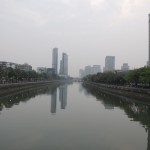
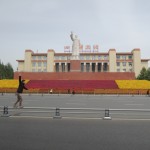
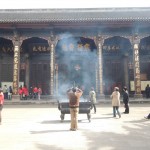
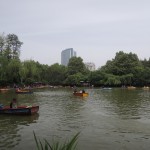
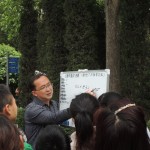
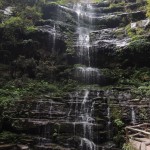

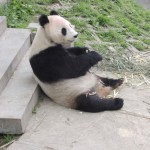

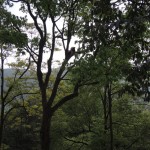

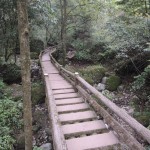
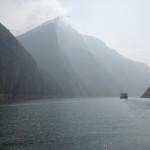
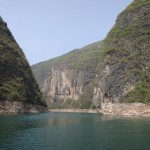
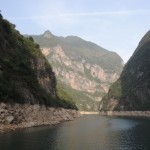
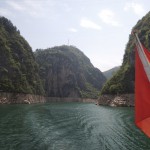
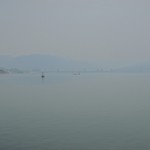
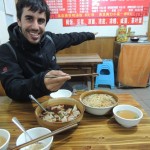
We were shocked to hear about the terrible earth-quake which affected the Sichuan Province past night. Thinking about the destroyed area in and around Ya’an we liked so much makes us sad and we hope that the damages are not too extreme. We wish all the best to the residents there and may they have the necessary strength to endure the next days and months.
http://www.bbc.co.uk/news/world-22228225
Wer die majestätischen Schluchten bewundern will, die der Yangtze-Fluss ins Chinesische Bergland gegraben hat, der kann zwischen zwei Möglichkeiten wählen: Ganz entspannt wird die Reise mit den großen, auf westliche Touristen ausgerichteten Reiseagenturen, mit westlicher Küche, professionellen mehrsprachigen Guides und komfortablen Doppelzimmern. Nicht ganz so bequem ist die Bootsfahrt mit den einheimischen Anbietern, die sich auf chinesische Reisegruppen spezialisiert haben und diese günstig, aber in spartanisch ausgestatteten Schiffen durch die Schluchten lotsen.
Da wir, mein Reisepartner und ich, nach mehrmonatiger Reise schon recht entspannt sind, unser Budget im Blick behalten müssen und außerdem das Ungewöhnliche attraktiv finden, entscheiden wir uns für Variante Zwei – und landen als einzige Ausländer auf einem Schiff mit 250 Chinesen. Englisch spricht hier, zwischen Chonqching und Yichang niemand, und in den chinesischen Schriftzeichen finden wir ungefähr so viel Informationen wie in einem Kaffeesatz. Ein Guide mit grundlegenden Englisch-Kenntnissen sei auf dem Schiff zu finden, wurde uns vorher gesagt und kurz vor dem Ablegen tritt tatsächlich eine junge Dame in unsere Kajüte, die sich in drei Anläufen als unsere Betreuerin vorstellt. Erkennbar war Englisch Bestandteil ihrer Ausbildung, das Lesen klappt gar nicht schlecht. Aber jetzt, wohl zum ersten Mal, steht sie vor großen, bärtigen Menschen mit langen Nasen und muss ganz neue Sätze im Kopf konstruieren. Sie gibt sich die größte Mühe, sie verheddert sich immer wieder in der Grammatik, ihre Erinnerung bockt vor schwierigen Vokabeln, panisch wirft sie ihre Netze in das Meer aus Merkregeln von der Universität. Vergeblich – nach drei Sätzen rennt sie hysterisch schreiend hinaus und ward nicht mehr gesehen.
In dieser Situation merken wir, was für tolle Menschen die meisten Chinesen sind. Das Land hat in Europa nicht unbedingt den besten Ruf, seine fremde Kultur und sein rascher Aufstieg machen Angst. Im Reich der Mitte selbst aber begegnen uns die Chinesen unheimlich offen, neugierig und hilfsbereit – wenn man von den Staatsbediensteten oder den Menschen an den Touristenzentren einmal absieht. Diese Erfahrung machen wir nicht nur auf dem Schiff, sondern während unserer ganzen Reise. Auf dem Yangtze jedenfalls dauert es nicht lange, da hat sich die Anwesenheit der seltsamen Passagiere herumgesprochen und spätestens am zweiten Tag nehmen wir die Spitzenposition in der Rangliste der beliebtesten Fotomotive ein. Schüchtern fragen unsere Mitreisenden nach einem Bild mit uns, freudig zücken sie das Ipad, wenn wir einwilligen und postieren sich unsicher lächelnd für die Aufnahme. Wer hätte gedacht, dass dieses Land mit seinen versmogten Städten, mit seiner autoritären Regierung und seiner erkennbar kollektivistischen Tradition so ursprünglich sein kann?
Bewundernswert ist die Kreativität, die die Chinesen an den Tag legen, wenn es darum geht, uns zu helfen oder einfach nur mit uns ins Gespräch zu kommen. Haben wir ein wichtiges Anliegen, so ruft unser Gesprächspartner oft einen Freund an, der Englisch spricht und als Dolmetscher fungiert. Können wir die Speisekarte nicht lesen, dann führt uns der Kellner einfach in die Küche und wir wählen unser Menu aus den Zutaten aus. Und wenn unsere europäische Zunge die sorgfältigst auszusprechenden chinesischen Vokale so fürchterlich herunterpoltert, dass die Chinesen nocht nicht einmal unser Herkunftsland verstehen, dann verdoppeln sie einfach ihre Geduld. Mein Reisepartner ist Franzose, er malt einfach den Eiffelturm und ist aus dem Schneider. Ich versuche es mit bekannten deutschen Persönlichkeiten. Weil ich als 1989 Geborener keine Lust habe, mein Land über Krieg und Verbrechen zu definieren und außerdem nicht als Österreicher gelten mag, rassele ich die Liste der besten Sportler herunter. Bei “Dirk Nowitzki” macht es meistens Klick. “De Guo”, rufen unsere Gesprächspartner dann oft aus – “Deutschland”. Ja, so ungefähr hatten wir das am Anfang auch aussprechen wollen.
http://www.echo-online.de/region/darmstadt/Mit-Dirk-Nowitzki-geht-alles-leichter;art1231,4112688